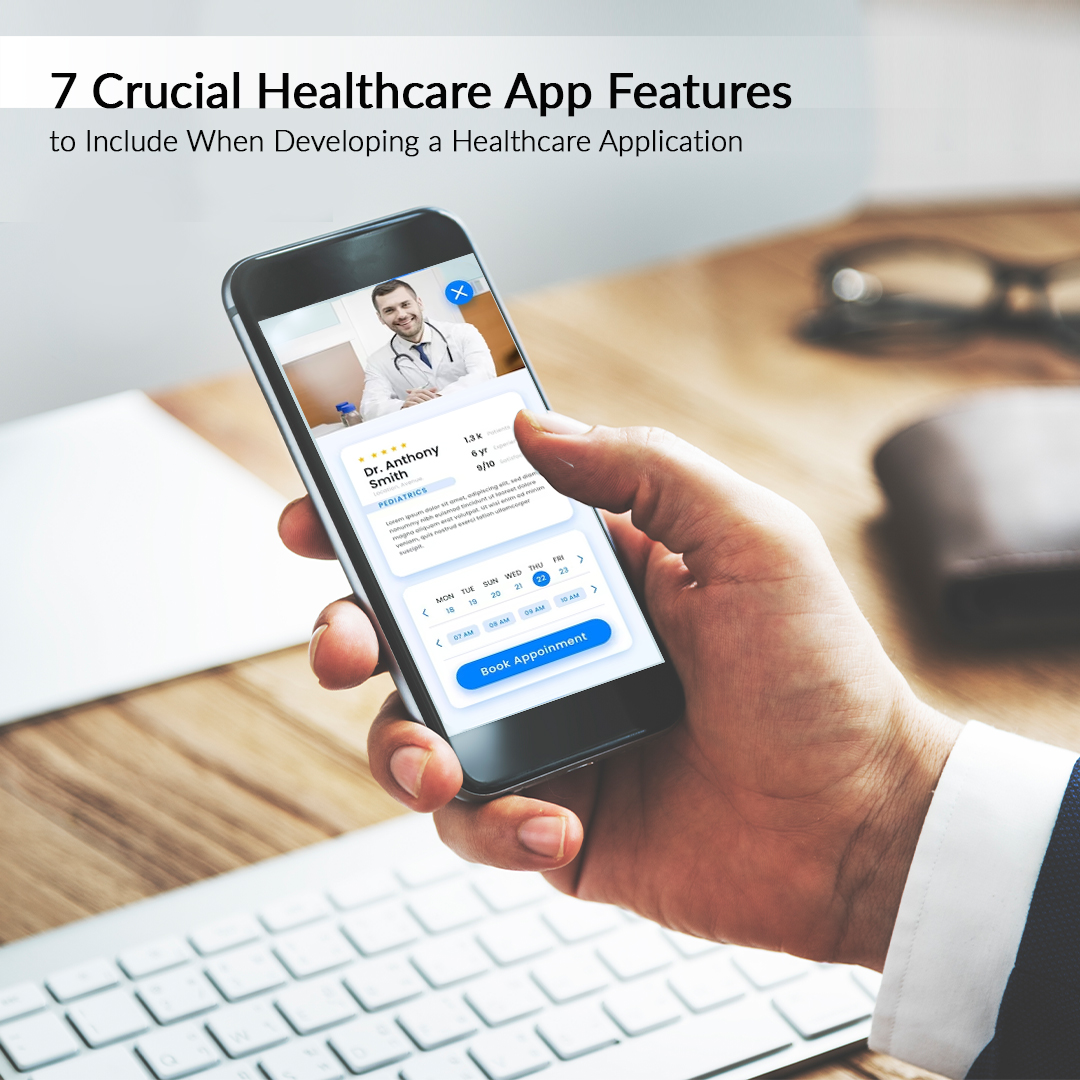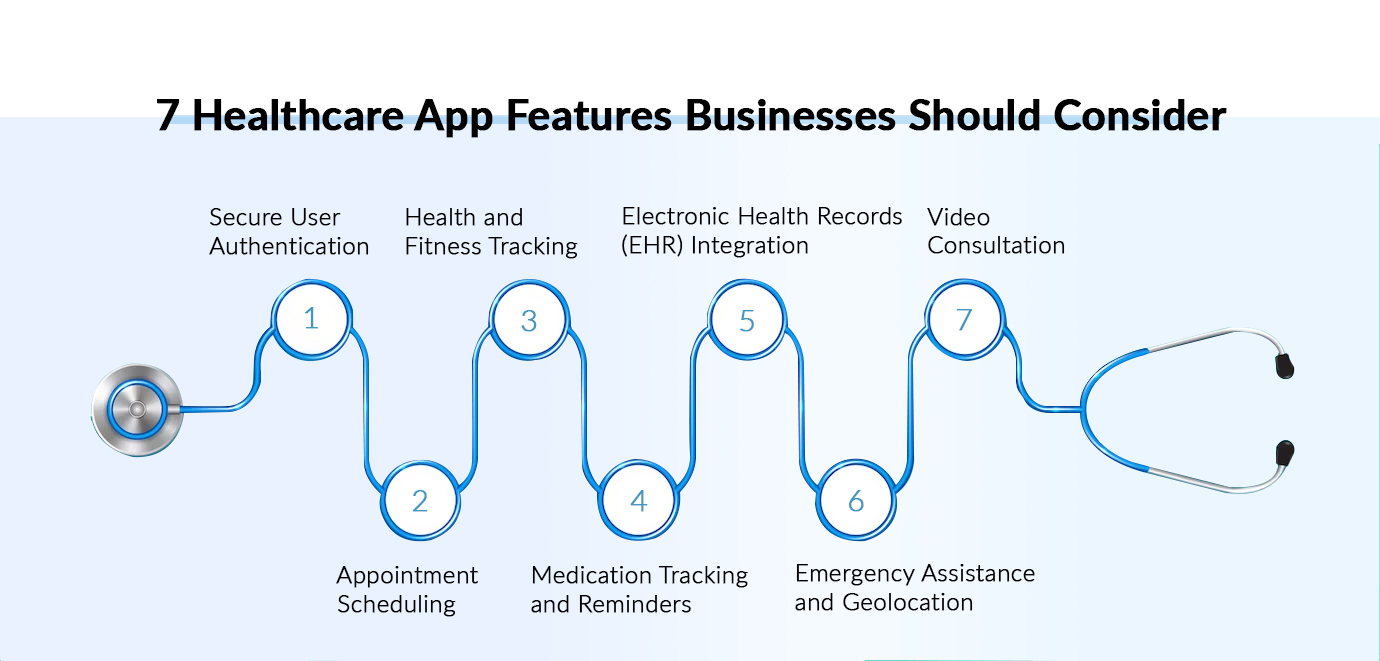Healthcare App Features that Businesses Must Consider
These features are designed to provide significant value to both healthcare professionals and stakeholders involved in healthcare technology.

“The global mHealth apps market is estimated to be $ 38.89 billion in 2021 and is expected to $ 314.60 billion in 2028 with a CAGR of 34.8% in forecast period.”– Statista
7 Healthcare App Features
Explore these seven essential healthcare app features and delve into crucial aspects businesses must consider, ensuring seamless user experience, data security, and efficient healthcare services. From user-friendly interfaces to robust data encryption, these elements form the backbone of successful and trustworthy healthcare applications.
 1. Secure User Authentication
1. Secure User Authentication
Secure user authentication is a critical feature in healthcare apps to protect sensitive user data and ensure the privacy and confidentiality of personal health information. It involves implementing robust security measures to verify the identity of users accessing the app. This typically includes multifactor authentication (MFA) methods such as passwords, biometrics (fingerprint, face recognition), or one-time passwords (OTP). Additionally, encryption techniques are employed to safeguard user credentials during transmission and storage. To further enhance security, incorporate healthcare app features like session timeouts, device authorization, and monitoring for suspicious activities. By implementing strong and secure user authentication, healthcare apps can mitigate the risk of unauthorized access, data breaches, and identity theft, instilling trust, and confidence in users that their personal health information is protected.
2. Appointment Scheduling
Appointment scheduling is a fundamental and efficient feature that enables patients to conveniently book appointments with healthcare providers. By incorporating appointment scheduling capabilities into a healthcare app, patients can access this service anytime and anywhere, enhancing convenience and accessibility. Healthcare providers benefit from streamlined resource management as they can allocate time slots based on availability, thereby reducing waiting times and optimizing the utilization of healthcare professionals, facilities, and equipment. With automated appointment scheduling, manual tasks are eliminated, reducing administrative burdens for both patients and healthcare providers. This automation also helps to decrease no-show rates, improve patient adherence, and facilitate better time management for healthcare professionals. Real-time visibility of healthcare professionals’ availability empowers patients to choose the most suitable appointment slots, promoting informed decision-making and enhancing the overall patient experience.
3. Health & Fitness Tracking
Health and fitness tracking is a valuable feature in healthcare apps that allows users to monitor and manage their overall well-being. With health and fitness tracking, users can record and analyze various metrics such as physical activity, sleep patterns, heart rate, calorie intake, and more. By collecting and visualizing this data, users gain insights into their lifestyles and can make informed decisions to improve their health. Health and fitness tracking within a healthcare app provides a holistic view of a user’s progress toward their health goals. It enables users to set targets, track their achievements, and receive personalized recommendations based on their data. This feature can also include reminders and notifications to encourage users to stay active, maintain healthy habits, and adhere to their fitness routines. Moreover, health and fitness tracking can promote engagement and motivation through gamification elements. Users can compete with friends, earn rewards, and participate in challenges, fostering a sense of achievement and social support. By integrating health and fitness tracking into a healthcare app, individuals have a powerful tool at their fingertips to proactively manage their health, monitor their progress, and make positive lifestyle changes for a healthier future.
4. Medication Tracking & Reminders
With medication tracking, users can record and monitor their prescribed medications, dosages, and schedules, ensuring they stay on top of their treatment plans. This feature provides a comprehensive overview of medication history, enabling users to track their adherence and identify any patterns or issues. Reminder functionality plays a crucial role in medication management. Users can set personalized reminders to take their medications at specific times, helping them adhere to prescribed regimens. These reminders can be in the form of push notifications, alarms, or alerts, ensuring that users never miss a dose. Additionally, medication reminders can include notifications for medication refills, helping users maintain an uninterrupted supply of their medications. By incorporating medication tracking and reminders into a healthcare app, users can enhance medication adherence, reduce the risk of missed doses or incorrect usage, and improve overall treatment outcomes. These healthcare app features empower individuals to take control of their medication routines, promoting better health management and fostering a safer and more effective healthcare experience.
5. Electronic Health Records (EHR) Integration
Effective data management in healthcare apps involves seamless integration with electronic health record (EHR) systems. This ensures accurate synchronization and secure transmission of patient information, such as medical history, medications, allergies, and test results. By enabling healthcare providers to access up-to-date patient records, data management facilitates informed decision-making and continuity of care. Furthermore, efficient data capture methods, including data entry forms, document scanning, and OCR, ensure accurate and reliable input of patient data. Validation and error handling processes maintain data integrity. Healthcare apps generate a wealth of data that can be utilized for analytics and insights, enabling healthcare providers to identify patterns, trends, and correlations for improved care and outcomes. Adherence to standardized data formats, communication protocols, and health information exchange (HIE) standards ensures interoperability and seamless care coordination across different healthcare settings. Health records integrated within the app empower patients to access their health information, engage in their care, track progress, set goals, and access educational materials. Additionally, aggregated, and de-identified health records can contribute to research and population health management efforts, providing insights into disease prevalence, risk factors, and healthcare utilization patterns.
6. Emergency Assistance & Geolocation
Emergency assistance and geolocation are crucial healthcare app features, particularly in situations requiring immediate medical attention. By integrating these healthcare app features, users can quickly access emergency services such as ambulances or helplines directly from the app. Geolocation capabilities accurately determine the user’s location, allowing the app to provide relevant and timely assistance. In emergencies, the app can identify nearby hospitals, clinics, or urgent care centers, guiding users to the nearest facility efficiently. Geolocation also helps users make informed decisions about medical care based on real-time information about nearby providers’ specialties, working hours, and contact details. During natural disasters or public health emergencies, the app can provide information on emergency shelters, relief centers, and vaccination sites. Geolocation is particularly valuable for caregivers monitoring loved ones with specific medical conditions, offering added security and peace of mind. It can also be integrated with personal safety features like panic buttons, alerting emergency contacts or healthcare providers about the user’s location and situation.
7. Video Consultation
Video consultation in healthcare apps enables virtual appointments, eliminating the need for in-person visits. It benefits individuals in remote or underserved areas, connecting them with specialists regardless of location. Patients can schedule virtual consultations, saving time and travel costs. Continuity of care is enhanced as patients can connect with their regular healthcare providers and receive follow-up care or advice on medication adjustments. Video consultations reduce healthcare costs by eliminating travel expenses and unnecessary emergency room visits. They also ensure secure and private communication through encryption and comply with privacy regulations. Integration with health records and payment systems allows seamless documentation, record updates, and secure payment processing. Video consultation in healthcare apps provides convenient, cost-effective, and secure healthcare access for patients and healthcare providers alike.
Further Read: Unfolding Health Tech Revolution: The Next Big Thing in Digital Healthcare
Conclusion
Developing a healthcare application with essential features can revolutionize healthcare delivery. These healthcare app features offer significant value and convenience for patients and healthcare professionals alike. By incorporating these capabilities into your healthcare application, you can foster patient engagement, streamline healthcare processes, and enhance the overall patient experience. Embrace the potential of technology and embark on a transformative journey to revolutionize the healthcare industry with innovative, user-centric mobile applications. At NextGen Invent, we specialize in developing innovative healthcare applications that leverage the latest technologies and best practices. If you’re looking to bring your healthcare app idea to life or revamp your existing application with these top healthcare app features, our team of experienced engineers are here to assist you.
Contact us today to discuss your requirements, and let’s collaborate to create a future-proof healthcare application that revolutionizes the industry. Together, we can make a difference in the lives of patients and healthcare providers alike.
Stay In the Know
Get Latest updates and industry insights every month.
 1. Secure User Authentication
1. Secure User Authentication